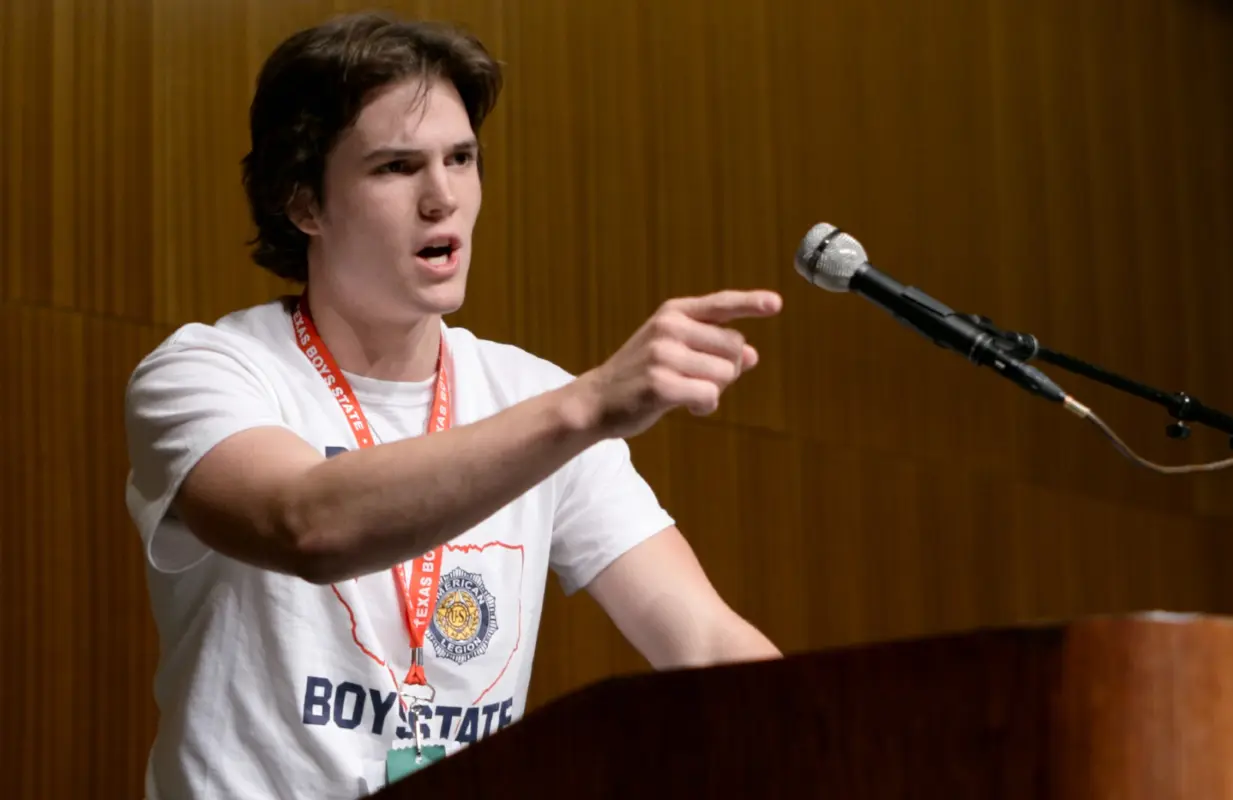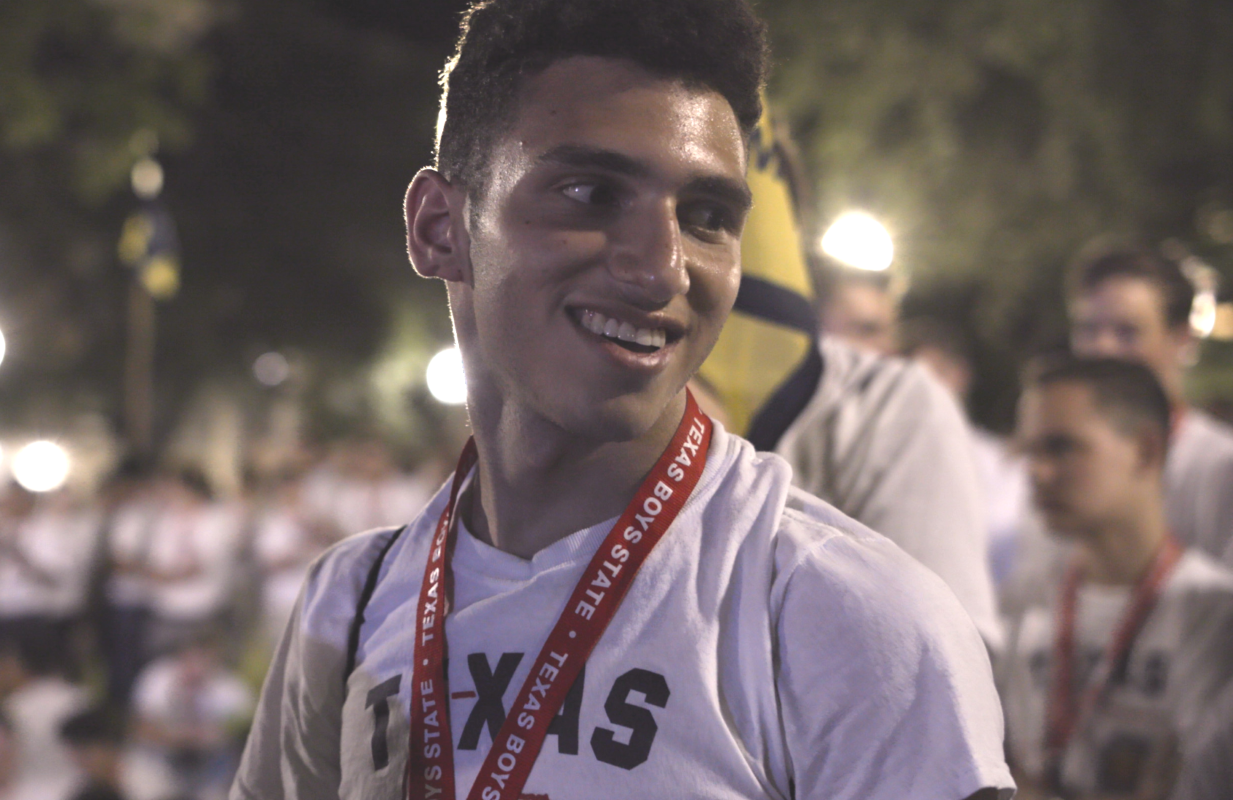If You Watch One Political Film This Year, Make It Boys State
-
 Texas Boys State gubernatorial candidate Robert MacDougall makes a campaign speech in Boys State. (Photo: Apple TV+)
Texas Boys State gubernatorial candidate Robert MacDougall makes a campaign speech in Boys State. (Photo: Apple TV+)Boys State might be the essential political film to watch this year. If you’ve never heard of Boys State — or Girls State, for that matter — it’s an exercise in democracy that the American Legion has been running since the 1930s. Every summer in every state but Hawaii, thousands of high school juniors are selected for a weeklong immersive crash course in running for office.
It’s not mock government. Boys State and Girls State are all about retail politics — the handshaking, petition-signing, speechifying, jockeying for support, rallies, and finally, election day. The VIP list of alumni, which includes at least 10 current U.S. senators and dozens of current and former state and federal officials, suggests that for a lot of future politicians, Boys State was their initiation.
All of which may lead you to think that Boys State, winner of this year’s Sundance Grand Jury Prize, is about a long-in-the-tooth leadership camp. Actually, it’s not. It is, rather, a timely parable about our broken political system, a system that is no longer dedicated to governing but to campaigning, a system that was once fueled by ideas and platforms but is now powered by conflict and branding and continuous money-raising. Legionnaires promote Boys State as an exercise in “civil discourse” and “citizenship development,” but as we see in Jesse Moss’s and Amanda McBaine’s spellbinding film, it can also be an mirror of the divisive politics that grown-ups play for keeps.
McBaine and Moss filmed the 2018 Texas Boys State in Austin, probably the biggest of the Boys States, with 1,100 participants. And while there are dozens of offices up for grabs during the week — everything from county commissioner to state supreme court justice — this film follows just a handful of aspirants in their quest to win the big prize of Boys State: the governorship. Being Boys State governor means getting your ticket punched to Boys Nation in Washington, D.C. (where Bill Clinton famously shook hands with JFK), and having your name and picture in newspapers all across the state.
As an alumnus of Boys State and Boys Nation, I loved the propulsive energy of this film. It took me right back to that mad week when I was thrown into a huge auditorium with boys from across Montana, given a crash course in civics, and told to start making friends.

Moss and McBaine keep it simple, focusing on just the governor’s race and the four young men crucial to the outcome: the two nominees and the two state party chairs. When you arrive at Texas Boys State, you’re assigned to either the Federalist or the Nationalist party. Ben, a gung-ho double amputee, arrives thinking he’ll run for governor, but then realizes he’d rather be party chair, which is where the real action is.
His counterpart is René, who’s black and recently transplanted from Chicago. “I’ve never seen so many white people, ever,” is his impression of Boys State. Ben is a white conservative (who says things like, “I don’t think of myself as white”) and René is, I’m guessing, center-left, but that doesn’t matter. They and their 1,100 peers were sorted into Nationalist and Federalist bins by random selection, not ideology.
So what do you do in that situation, when ideology can’t divide people? If you answered, “You bring people together,” then you, my friend, are a naive fool. What makes Boys State a parable of our ridiculous politics today is that Ben finds a way to create a partisan storm worthy of Fox News out of absolutely nothing.
It happens when René objects to a procedural matter during the campaign rallies. The objection seems minor, but Ben goes ballistic, calling René “morally bankrupt” and declaring that their disagreement shows “a moral difference between the leadership of these two parties!!” René takes the bait, complaining that Ben is “demagoguing against a person — not a party, a person,” which fails to persuade and effectively cedes the point to his rival.

Later, admitting that he probably went too far, Ben stops short of apologizing for his tirade. “A message of unity,” he says, “is not winning anyone any elections. You have to use personal attacks and you have to find divisive issues in order to differentiate yourself at all.”
When I was at Boys State, the way you differentiated yourself was to put on a good campaign rally. Ours featured comedy sketches, a marching band, and pretty girls (don’t hate me, it was the Reagan years). Maybe I should have taken away the real meaning of Boys State, which is that entertainment and tribalism go together. Apparently that was what Rush Limbaugh and Roger Ailes learned when they attended Boys State.
The directors understand this, which is what makes their film so shrewd and unnerving. In the opening minutes there’s a scene of a counselor standing in front of a room of attentive Boys Staters, reading to them from Neil Postman’s book Amusing Ourselves to Death: Public Discourse in the Age of Show Business. Writing in 1985, before smartphones or 24/7 news cycles, Postman could already see that Americans were turning away from the printed word of newspapers and journals, which had informed the Founding Fathers, and were instead getting their political insights from TV and radio. In the show-business world of electronic media — which now includes Twitter and Facebook — Postman grimly prophesied that people would gravitate to the voices that were the most compelling, even if they were spouting garbage.
I’m surprised a Boys State documentary hasn’t been made until now, because seven days on a confined campus with one person emerging the victor sounds like a reality-TV pitch. As brilliant as this film is, I’d like to see more like it. It’s useful to monitor the state of American politics by seeing it through the eyes of its future leaders. Next time, though, may I suggest going to the real future of politics — Girls State.
Boys State drops on Apple TV+ Friday August 14th.
Aaron Barnhart has written about television since 1994, including 15 years as TV critic for the Kansas City Star.
TOPICS: Boys State, Apple TV+, Fox News Channel, Roger Ailes